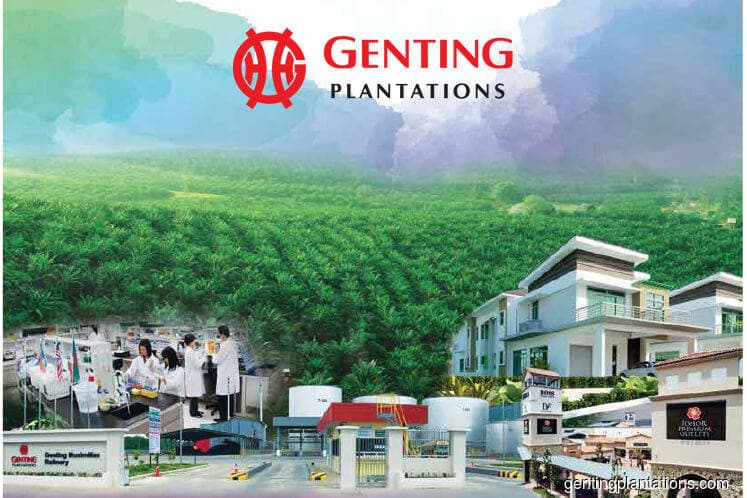
KUALA LUMPUR (Sept 24): Genting Group is among 10 palm oil companies with the largest areas of burned land in Indonesia between 2015 and 2018 but received no serious civil or administrative sanctions, Greenpeace claims its mapping analysis in Indonesia has revealed.
The analysis showed some 8,100ha of Genting's concessions had been burned during the period. Others in the top 10 are: Sungai Budi/Tunas Baru Lampung (with 16,500ha), Bakrie (16,500ha) Best Agro Plantation (13,700ha), LIPPO (13,000ha), Korindo (11,500ha), Fangiono Family (9,200ha), Amara (8,000ha), Salim (7,800ha) and SIPEF (7,800ha).
“The Indonesian government has not revoked a single palm oil licence due to these forest fires, nor has it given any other serious sanctions to these 10 companies,” Greenpeace said in a statement accompanying the release of its findings today.
However, in a letter sighted by theedgemarkets.com, Genting Plantations Bhd's Indonesian unit PT Globalindo Agung Lestari (PTGAL), which was listed in the analysis as having 5,000ha of burned land during the period, said no significant burned area has been found in its concession area.
“Based on the burn area map from the Indonesian Ministry of Environment and Forestry of the concession area, no significant burned area was found. The burned area was largely outside the concession area,” said PTGAL in response to Greenpeace's allegations.
"This is comparable to PT Globalindo Agung Lestari's 2016-2018 internal data for three years, which showed burned planted areas covering 6.8 hectares, while the burned area in the community-owned side was 203ha. Investigations showed the cause of the fire was unknown/comes from the community-owned land that was cleared for crop planting," it said.
The Indonesian unit went on to say that its fire-fighting team has been extinguishing fires in coordination with local authorities and communities, and that hotspot monitoring via satellite is conducted each morning and evening during the dry season, together with daily fire patrols.
“All incidents of burning have been reported to the relevant authorities. We also report to the Roundtable of Sustainable Palm Oil (RPSO) through the Burning Hotspot Monitory system, as dictated by RSPO,” it said.
"Genting Group, through Genting Plantations Bhd is committed to opening land without burning with the application of the No-Burn Policy. Genting Plantations Bhd has been a member of the RSPO since 2006 and seeks to apply sustainable criteria (sustainability) in all of its operations," it added.
Greenpeace, however, said its analysis used official government ‘burn scar’ data, which showed over 3.4 million ha of land burned between 2015 and 2018. "This data was then compared to the best available concession data on palm oil and pulp companies as well as administrative and civil law sanctions against companies, which were compiled through Freedom of Information requests and official government reports," it said.
Besides the palm oil industry, the pulp sector has also largely escaped serious government sanctions, it said, despite repeated fires across massive areas of land. "This year, fire hot spots have been recorded in many of these same palm oil and pulp concessions," it said, adding its findings are in sharp contrast to the Indonesian government’s claims of being tough on fires and law enforcement.
It also said its Indonesian arm had earlier this year found that none of the companies taken to civil court by the Indonesian government for their role in forest fires and illegal logging have paid compensation, which amounted to more than US$1.2 billion.
“Tackling forest fires is not only Indonesia's responsibility alone. Both the Malaysian and Indonesia governments need to look at where the fires are burning, why, and who is behind them to hold the main culprits behind the fires accountable; especially now that haze from Indonesia forest fires are spreading beyond the country's boundaries, including Malaysia,” said Greenpeace Malaysia Campaigner Heng Kiah Chun.
Asean members must cooperate with the Indonesian government to tackle this problem once and for all, he said, and take effective action to implement the Transboundary Haze Pollution Act to hold reckless companies accountable, following Asean leaders' failure to come up with the strong implementation of the Asean Agreement on Transboundary Haze Pollution in 2014, due to, among others, lack of transparency and conflict of interests.
Last week, Indonesia blamed four Malaysian companies, including the world's biggest producer of sustainable palm oil, for causing some of the forest fires that raged within its borders, following Malaysia's claim that its forest fires had caused a smoky haze that compromised air quality in Malaysia.
The four named were West Kalimantan-based Sime Indo Agro, a unit of Sime Darby Plantation Bhd; Sukses Karya Sawit, a unit of IOI Corp Bhd; Rafi Kamajaya Abadi, a unit of TDM Bhd; and Riau-based Adei Plantation and Industry, a unit of Kuala Lumpur Kepong Group.